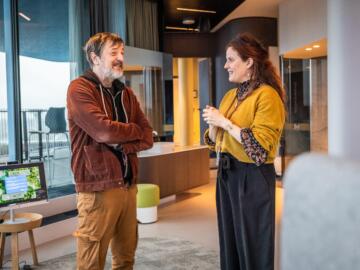What will the Limburg region look like in 2040? That was the central question in a future exploration project for the province of Limburg (Belgium). TomorrowLab helped Limburg to develop four possible and plausible future scenarios, which enabled the province’s stakeholders to make well-informed decisions.
Technological developments, a changing economic and political power balance, global warming, and an increasing world population: all of these changes will influence spatial planning in Europe, Flanders and the province of Limburg. How can Limburg anticipate these changes? And how can the province best adapt to this changing world?

The challenge: a new vision for spatial planning in Limburg
In Belgium, spatial development is chiefly a policy matter of the regions, but the intermediate provincial governments can adapt the Flemish guidelines to their specific needs.
“Unlike the rest of Flanders, Limburg has lots of open space, human-scale cities and, unfortunately, also quite a few mobility challenges,” says Inge Moors, representative policymaker for spatial planning at the province of Limburg. “This unique character needs to be reflected in the spatial plans we develop.”
“Limburg wanted to know whether its policies would be able to withstand the future, which is why they called upon us,” says Dorothy Mingneau, innovation designer at TomorrowLab. “The idea behind this was that, once you know your options for the future, you can make better planning decisions today.”
Once you know what the future can bring, you can make better decisions today.
TomorrowLab’s scenario planning methodology follows a proven and structured approach, with co-creation as an essential ingredient.
First, the province of Limburg composed a core team of spatial planning experts, as well as a mirror team that acted as a sounding board. TomorrowLab relied heavily on the input of both teams, which were brought together at regular intervals.
Next, a mix of external experts with diverse profiles was selected to give their view on potential future developments in Limburg’s living environment. Entrepreneurs, academics, architects… TomorrowLab brought in a wide range of experts who were able to express a well-founded vision of the future and whose expertise intersected with spatial planning in one way or another.
The knowledge of the experts was validated by the internal Limburg team again. “Bringing the external knowledge back into the internal team gave everyone the opportunity to develop their opinion based on new knowledge,” says Dorothy Mingneau.
Bringing the knowledge of external experts back into the internal team gave everyone the opportunity to develop their opinion based on new knowledge.
Scenarios as a starting point for discussion
Scenario planning helps organisations to deal with an uncertain future. As a policymaker, the future is not always clear. But by thinking ahead, in a substantiated way, you can make sure your ideal future has a bigger chance of success. By presenting four different scenarios, Limburg was able to engage in a dialogue about the future with its community.
The aim is not to force the province of Limburg into choosing any of the four future scenarios. Instead, these scenarios are intentionally amplified in order to stimulate the public debate.
“Some of the scenarios we developed were quite uncomfortable,” says Jo Schoefs, spatial planner at the province of Limburg. “But at least by making these scenarios explicit, we have made a number of relevant issues for the future of Limburg discussable. The scenarios also stimulated us to think further about our own desirable future. TomorrowLab was an important partner in this process. They have expanded our horizons and guided us in a professional and independent way.”
By making these scenarios explicit, we are stimulated to think further about our own desirable future.
Fifth scenario
The scenarios were incorporated into in an animation movie and presented at Limburg’s Future Congress in June 2019. The event was open for a wide audience and the scenarios offered a great starting point for further discussion.
More than that, the four scenarios have significantly influenced how the Limburg administration has developed its own plan for the future, as a fifth scenario.
“Thanks to the scenario planning project, we have been able to reach a much wider audience,” says Veronique Vranken, spatial planner at the province of Limburg. “Whereas in the past we used to talk to planners and city administrators only, now we also attracted citizens, architects, entrepreneurs, academics, students and others to join the discussion. And what’s more, we have been able to stress-test our own plan against the four scenarios.”
Strategy stress testing

How can AI be effectively integrated in the work process?
Embracing AI tools can elevate our professional capabilities and boost efficiency and productivity. However, mastering these tools takes time, commitment, and a willingness to experiment and learn through trial and error. Here are some practical tips & tricks to kickstart your AI journey.

Navigating the first stress-test of scenario planning
Last week, I had the privilege of taking another enlightening journey through the realm of scenario planning and future strategy with a group of high-flyers from different disciplines. It was the first time this group subjected their carefully prepared scenarios to a stress test. This moment, brimming with a delightful mix of joy, anticipation, and a touch of nervousness, was a milestone for all involved.

The future of mobility and how it can impact you
The way we think about and organise mobility is dramatically changing. Over the past decades, transportation and urban development have been centred around owning a combustion engine vehicle and driver comfort. Today, policymakers, technology developers, manufacturers, and urban planners are increasingly focusing on smart mobility. Various modes of transportation, urban redesign, and changing business models seek to integrate sustainability, safety and efficiency in smart mobility.
